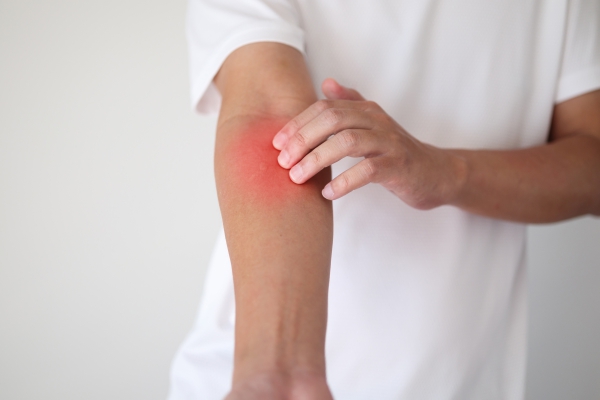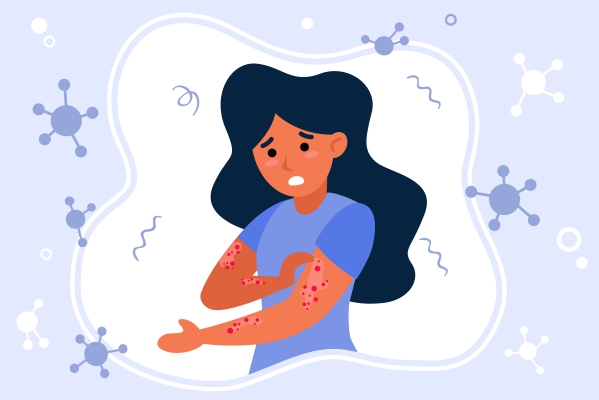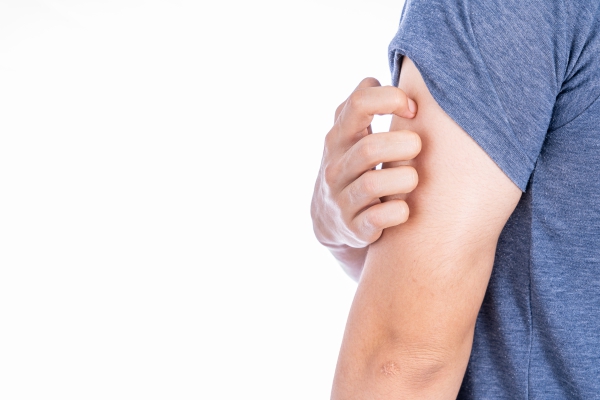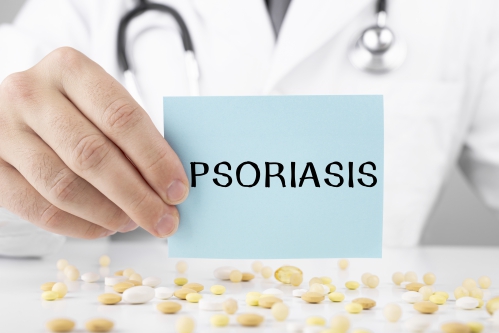What is atopic dermatitis?
Atopic dermatitis, also known as eczema, is a long-standing, itchy inflammatory skin condition that is usually present on the face, neck, arms and legs. It usually spares the groin and armpits. In this condition, the skin appears dry and scaly and can affect infants, children as well as adults. It is common in people who have allergic tendencies such as food allergy, asthma and allergic rhinitis.
Around the world, the prevalence of atopic dermatitis keeps on increasing with time and is present in 15-30% of children and 2-10% of adults. It is also becoming more common among immigrants. It is a disease that affects people of all races and is slightly more common in women compared to men. Atopic dermatitis is more common in the first year of life (85%). It can follow a relapsing and remitting course, meaning that if you have the disease, you will experience periods without any symptoms alternating with periods of flares.
Atopic dermatitis is not considered to be a serious condition as it can be easily managed with the various treatment options.
What are the causes and risk factors of atopic dermatitis?
The exact cause of atopic dermatitis is not completely understood. However, it is known that genetics play a big role. Certain mutations in specific genes can make you more at risk of having atopic dermatitis.

Some other factors that can be related to atopic dermatitis include:
- Infection: Some skin infections can trigger flares of atopic dermatitis. The most common pathogen responsible is S aureus.
- Climate: Flares of atopic dermatitis can occur in both extreme heat and extreme cold. In dry areas, you are more prone to have dry skin. It has been observed that exposure to sunlight improves lesions while sweating makes them more itchy.
- Tobacco: Some studies have shown that childhood exposure to cigarette smoking can increase the risk of having atopic dermatitis in adulthood.
- Family history: If you have close family members with atopic dermatitis, allergies, hay fever or asthma, you or your child has a high risk of having the skin disorder.
What are the symptoms of atopic dermatitis?
Atopic dermatitis can present with a variety of symptoms including:
- Dry skin
- Severe itching, more noticeable at night
- Red lesions on the skin
- Small bumps on the skin
- Flaking of the skin
- Thickened and darkened skin
- Extra skin fold under the eye also known as the Dennie-Morgan fold.
The body parts most commonly affected by atopic dermatitis include the back of the neck, elbow creases, back of the knees, face, trunk, wrists and forearms.

Atopic dermatitis follows an intermittent course with flares alternating with periods of remission. Scratching of skin due to pruritus can result in infection of the skin.

How is the diagnosis of atopic dermatitis made?
The diagnosis of atopic dermatitis starts by taking a thorough history. Your doctor will then proceed by performing a physical examination.
There is no specific test to diagnose atopic dermatitis. The diagnosis of eczema is mostly made clinically and by examining the distribution of the skin lesions. Your doctor will suspect the diagnosis of atopic dermatitis if you have a history of chronic itching and dryness of skin as well as a personal or family history of allergies.
How is atopic dermatitis treated?
There is no cure for atopic eczema. However, there are a variety of treatment options that can help to control your symptoms and improve your quality of life. These treatment options include the following:
- Identifying triggers: The first step in the treatment of atopic dermatitis is to identify possible triggers of flares and avoiding them. Some possible triggers may include cold or dry environments, sweating, stress, anxiety, rapid temperature changes and exposure to certain chemicals or products.
- Emollients: These include creams and ointments to keep your skin hydrated and preventing drying out of your skin. Thick creams and ointments are recommended in people with eczema as they contain little to no water. It is advised to apply emollients soon after your bath. They usually used twice a day.
- Bathing: Lukewarm baths or showers can alleviate itching symptoms that is present with atopic dermatitis. It is recommended to use unscented mild cleansers. You should avoid hot or long baths and showers as these can cause drying out of your skin.
- Steroids: Corticosteroid creams or ointments may be prescribed in atopic eczema. These may have to be applied once or twice per day. They help in relieving symptoms and moisturize your skin. The strength of the steroid prescribed will depend on the severity of your condition. Oral steroids on the other hand are reserved for acute treatment of severe flares.
- Ultraviolet light therapy: Also known as phototherapy, this can be used to control atopic dermatitis. However, it is associated with an increased risk of having skin cancer and is usually reserved for people with severe eczema.
- Immunosuppressant: These medications work by weakening your immune system. These drugs are usually reserved for severe cases and those who do not respond to the above treatments. However, they are associated with potentially serious side effects such as increased risk for infection.
- Oral antihistamines: These medications are useful in relieving itching of the skin. Some examples include diphenhydramine, hydroxyzine and cyproheptadine. Besides, these medications may cause drowsiness which can be beneficial in people who cannot sleep well due to itching.
- Wet dressings: Also known as wet wraps, can help in soothing and hydrating the skin as well as decreasing itchy sensation and redness. These usually are dampened gauze which are wrapped around the affected areas.


What are the complications of atopic dermatitis?
The following complications may be associated with eczema:
- Sleep disturbance due to incessant itching
- Bacterial and viral skin infection on affected areas that may be due to excessive scratching
- Asthma and hay fever often occur after having atopic dermatitis
What is the prognosis for atopic dermatitis?
The majority of people with atopic dermatitis will improve with time and appropriate treatment. One third of people with the condition will end up having allergic rhinitis while one third will have asthma. The incessant itch can cause significant impairment in some cases; some people may even have to stop working. Sleep disturbance is common among people with eczema.

Source:
Weston, W., 2020. Atopic Dermatitis (Eczema): Pathogenesis, Clinical Manifestations, And Diagnosis.
Weston, W., 2020. Treatment Of Atopic Dermatitis (Eczema).
Kim, B., 2020. Atopic Dermatitis Treatment & Management: Medical Care, Consultations, Diet.



